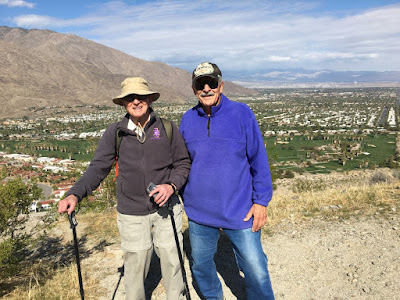A lot of us are getting older and we can’t do much about it. Every seven-and-a-half seconds another baby boomer turns fifty. At that rate, by 2030, the senior citizen population in the United States is expected to reach eighty million, outnumbering the population of young people for the first time in history. Seems to be happening to a lot of folks I know.
There are unprecedented changes confronting America as advanced age goes mainstream and more and more of us catch it. One book on the market puts it out there plain and simple: “The reality of aging will force us to come to terms with the fact that longevity doesn’t mean eternal youth. America is a society in collective denial of aging. We appreciate vintage in wine, not people.” *
 |
| Vaccination clinic in the Coachella Valley |
For
a while back in January and February, Southern California seemed to be at the
epicenter of the corona virus epidemic. Death and dying was a daily, hourly,
every couple of minute occurrence, at least in Los Angeles County. The on-going
mantra seemed to be: ‘Don’t get sick here because it might kill you.’
Hardest hit seemed to be the elderly who have a host of their own health issues anyway. The virus is an unfortunate addition to the challenges many of us face during the aging process.
I recently got a notice of my 60th high school reunion. Either by fortuitous foresight or a slip of the computer keys, the sender reminded us oldsters to: “Mark your calendars! This may be our last reunion so please plan to attend!!! Sounds like someone has written us off after the tender age of 78.
Growing older is a process that has a form and function of its own. We can only control it to a certain degree. Most of us had a pattern of behavior set before us from our parents and grand-parents years ago. Now it’s our own generation that is dealing with the myriad of issues associated with growing old. Some folks maneuver through their life changes with grace and calmness. Others with a sense of sadness and finality.
For most of us, it’s become a journey in which health has become more important than wealth and we are more aware of the concept of time passage. There is a coming recognition of life’s end and for some a reflection on a life lived. During this journey, many turn to religion, ‘making up for lost time’ or ‘making amends for past sins committed.’
One business executive I know, when told he had six months to live, wanted to keep working until the end and he did. Another decided that all traveling was off the table after age seventy. Others downsized after a lifetime of material accumulations and moved into senior housing.
Many decided to slow down their lives as most past generations have done. They’ve taken to heart the old mantra of ‘acting their age’ and have accepted many of the limitations placed on them by past generations (if only in their own heads.)
My prejudice toward growing older is simple enough. It’s too easy to follow past generations and the traps they left behind. To be fair, for many of them it wasn’t a trap but rather a recognition that after a lifetime of hard work, there awaited the reward of being able to slow down and do little to nothing.
That usually translated into watching a lot of television, a heightened interest in sports (Monday morning quarterbacking), distrust and disdain for politics and worst of all, a gradual isolation from the ‘real world’ that continued on around them. It’s almost as if retirement had sidetracked them from the ever-changing rhythms of modern life.
There’s a reason why senior retirement communities like ‘The Villages’ and ‘Sun City’ emphasize their tons of leisure activities and self-imposed isolation from the real world outside their guarded gates. It’s a collection of like-minded individuals who want to continue on with their well-earned leisure lives and damn the obstacles ahead like the aging process.
It’s interesting to note that in the last ten or so years, a plethora of books have been written about finding ‘new life’ in retirement and how to handle old age. Unlike the generations before them, many in the boomer generation have embraced this new attitude toward growing older.
It’s not the Frank Sinatra version of ‘Young at Heart’ but rather a sober, rational analysis of options available and choices to be made. Primarily it means staying engaged in the world around you and keeping your mind and body active.
While our bodies change and the world continues on, mind still matters. An active intellect can help ward off negative thoughts and offer a wide range of options for anyone even as their body inevitably slows down. Friendships, new and old, can refurbish the soul and reaffirm life’s beauty and charm.
All through her youth and middle age, my mother loved to dance. Then as her body slowed down, she turned to cards to keep her mind active and activated. Now that was one smart lady. I’m not much of a dancer but these feet can still take me up a mountainside and my fingers can still keep tapping computer keys. Mind and matter; we’ve got to keep them both moving.
*‘Aging in America’ written by photographer Ed Kashi and writer Julie Winokur which began as an award-winning story published by the New York Times Magazine.







No comments:
Post a Comment